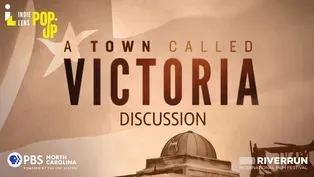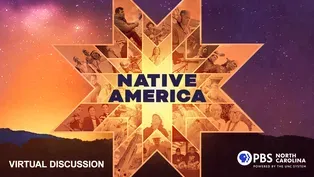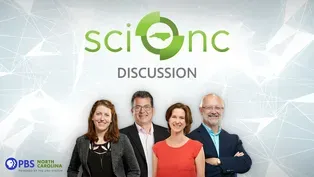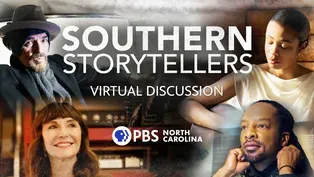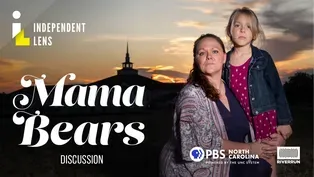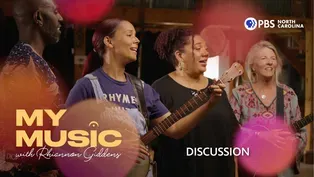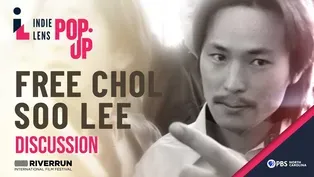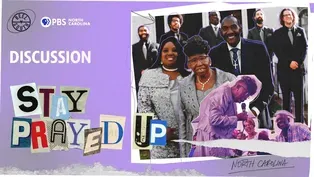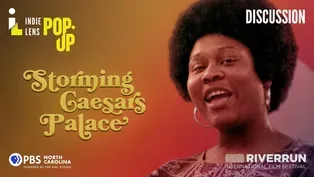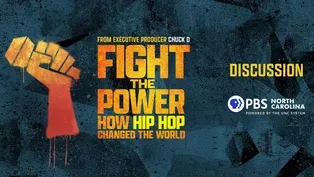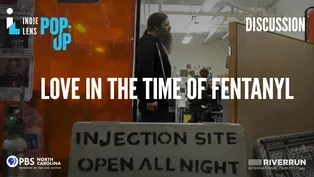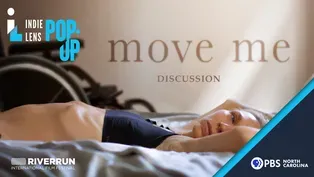PBS North Carolina Specials
Discussion | FRONTLINE American Reckoning
2/23/2022 | 35m 58sVideo has Closed Captions
PBS NC hosts a discussion about civil rights history and one family’s search for justice.
PBS NC’s Rachel Raney leads a conversation with filmmakers Yoruba Richen and Brad Lichtenstein and FRONTLINE impact producer Erika Howard. They discuss the film, civil rights history and racial violence in Mississippi and other Southern cities. They also try to define justice and how decades later, the family of Wharlest Jackson Sr. is still struggling to cope with his murder.
PBS North Carolina Specials
Discussion | FRONTLINE American Reckoning
2/23/2022 | 35m 58sVideo has Closed Captions
PBS NC’s Rachel Raney leads a conversation with filmmakers Yoruba Richen and Brad Lichtenstein and FRONTLINE impact producer Erika Howard. They discuss the film, civil rights history and racial violence in Mississippi and other Southern cities. They also try to define justice and how decades later, the family of Wharlest Jackson Sr. is still struggling to cope with his murder.
How to Watch PBS North Carolina Specials
PBS North Carolina Specials is available to stream on pbs.org and the free PBS App, available on iPhone, Apple TV, Android TV, Android smartphones, Amazon Fire TV, Amazon Fire Tablet, Roku, Samsung Smart TV, and Vizio.
Providing Support for PBS.org
Learn Moreabout PBS online sponsorshipMore from This Collection
Discussion - A Town Called Victoria - Independent Lens
Video has Closed Captions
The filmmaker and former Victoria residents share their story. (46m 51s)
Discussion - Native America Season 2
Video has Closed Captions
Panelists discuss preserving the languages of Native American tribes. (39m 1s)
Video has Closed Captions
Sci NC executive producer and host, Frank Graff, chats about upcoming Season 6 of Sci NC. (26m 6s)
Discussion - Southern Storytellers
Video has Closed Captions
Author David Joy and others discuss storytelling and their new PBS series. (42m 13s)
Discussion - Mama Bears | Independent Lens
Video has Closed Captions
Producer and director Daresha Kyi discusses the film and LGBTQIA+ advocacy. (34m 41s)
Discussion - My Music with Rhiannon Giddens
Video has Closed Captions
Discussing the series with producers Will & Deni McIntyre and country artist Rissi Palmer. (39m 56s)
Discussion - Free Chol Soo Lee | Independent Lens
Video has Closed Captions
Local lawyers, professors and nonprofit leaders discuss wrongful convictions and reentry. (40m 44s)
Discussion - Stay Prayed Up, Reel South
Video has Closed Captions
The filmmakers discuss their journey with Mother Perry and The Branchettes. (45m 4s)
Discussion - Storming Caesars Palace | Independent Lens
Video has Closed Captions
Local professors and nonprofit leaders discuss welfare and the social safety net. (33m 2s)
Discussion - Fight the Power: How Hip Hop Changed the World
Video has Closed Captions
Local experts discuss the history of hip hop with PBS North Carolina. (59m 43s)
Discussion - Love in the Time of Fentanyl | Independent Lens
Video has Closed Captions
Local harm reductionists, therapists and others discuss the opioid crisis and more. (55m 44s)
Discussion | Independent Lens: Move Me
Video has Closed Captions
A dancer with blindness and disability advocates discuss adaptable arts programs. (38m 46s)
Providing Support for PBS.org
Learn Moreabout PBS online sponsorship- Good evening, everyone.
Thank you for joining us.
I'm Rachel Raney, Director of National Productions here at PBS North Carolina.
I am particularly excited to be here with you tonight to moderate this conversation around Frontline's very powerful documentary, American Reckoning.
Many years ago, I got my very first job in documentaries working on Frontline programs at the esteemed Center for Investigative Reporting in San Francisco.
And I've been working in public media basically ever since then.
I'm very honored to be joined this evening by filmmakers, Yoruba Richen and Brad Lichtenstein and Frontline's Impact producer, Erika Howard.
So hopefully, they'll turn their cameras on and their microphones on and we will jump right in here so that we have time for a bit of conversation and some questions hopefully from our many, many attendees this evening.
And I'll remind you to please put your questions into the chat.
So welcome, everyone.
I'm gonna start with Brad just because Brad and I have known each other for awhile.
We go a little bit in the way back machine here.
Brad, when I first met you years ago, funnily enough, you were actually working on this film or a version of this film.
It was originally focused on John Lewis' deep belief in the power of forgiveness.
I remember something that he practiced even in his own life, including for the folks that beat him terribly during the civil rights era.
How did that project evolve into American Reckoning?
- Sure, first of all, thank you to you, Rachel and to PBS North Carolina for having us.
And it's true, Rachel, you were there at the beginning of this project.
It sort of got motivated originally when John Lewis was approached by a former Klan member who reached out and asked for forgiveness.
But a few years later in 2014, I was in Mr. Lewis' office and I had had a prior relationship with him having worked for him when I was 15 years old in his campaign in Atlanta.
And we were talking about that project, film projects and his press secretary and he pointed me to the cold cases.
And it grew out of a conversation about accountability and how hard it is to have forgiveness until there's accountability.
And that's what the Till Act was really about.
And that's how this project started.
- It's really amazing how these documentary films just can start as one thing and then by the time you get through with them, they're very different than you first imagined.
Yoruba, I wanna bring you in here.
Thank you for being here tonight.
I know you've made a number of historical documentaries.
It's a bit of a specialty of yours.
And this one really combines this deep, deep historical look at Natchez in the '60s with the current investigation that was unfolding of the cold cases.
How did you think about merging those two things?
I mean, it must have been really challenging.
- Yes, well, thank you for having us.
Thank you, PBS North Carolina for this discussion.
Well, as you said as you just said documentaries often start in one place and end up in another place.
It could a months journey or a years journey like this one was.
But that's also part of the fun.
And I think that how we... Part of the reason how we found that balance between the current day and the historical part of the film is really because of Frontline.
Frontline when they came on as producers of the project and we started showing them cuts, they really encouraged us to lean in to the archive and to the historical footage and the stories that were in that footage.
As you know, Frontline doesn't really do historical films that much.
And they're much more investigative, as you know.
So they were really...
So we were when we first came to them, we thought that it would be more towards the investigation part of it and not the historical part of the story.
But thankfully they saw that these stories in the archive and the history really was the only way to tell the current day story is to tell through the historical footage.
And so we were able to lean more into that and to find those stories there and bring out the story of the Natchez black freedom struggle.
- Which I mean just riveting watching the material that was filmed back then.
I think my jaw was literally on the ground on the scene where the men are taking the oath and it was just like what is happening, how are we even getting to witness this?
And I know that that's a topic, the Deacons of Defense was something that you were particularly interested in.
Tell me a little bit about that.
- Absolutely, when we saw that footage and then we saw Wharlest walk into that meeting, our jaws dropped even more.
The Deacons, and that of course is a meeting of men who eventually became the Deacons, most of those, the men who had sworn to defend their community and sworn to secrecy about it.
I was when Brad asked me to take a look at the project and consider working with him on it, he sent me the, and this is back in 2016, he sent me the initial trailer that he did where I saw that incredible archive footage that I'd never seen before.
And then I saw that the Deacons were part of the story.
And I had heard of the Deacons before that.
I had became a bit obsessed with them because they are so left out of our history and so left out of how we understand the black freedom struggle.
And so that really sealed the deal for me when I found out that their story was part of Wharlest's story and part of the story of Natchez.
And they of course were an armed black self defense group that protected the black community from white terrorism and Klan terror that was happening all throughout Louisiana and Mississippi.
- Incredible, Erika, I wanna bring you into the conversation.
As Yoruba mentioned, this is a bit of a departure for Frontline.
We're used to the really current day, hard-hitting investigations that they bring us week after week.
I'm such a huge fan of the series.
And I'd love to hear from you why you think Frontline thought that this was an important project to take on considering that it was one of these things is not exactly like the others, and what you all hope public media audiences are gonna take away from the project.
- Well, first of all, thank you so much for the invitation to be with you and the audience tonight.
It really is an honor.
I would have to say that, yes, doing an historical documentary has not been typically in the wheelhouse of Frontline, but in telling the stories about what's happening currently, in order to truly understand the state of where we are now, you have to connect back to history.
And I think this film does it exquisitely of really positioning people to reflect back on the civil rights movement where there might be this comfort level of people thinking that they know the stories of the civil rights movement and how that's affecting us now.
But with the work that Brad and Yoruba have done, they've been very skillful to bring out aspects that people haven't known about and can't take for granted in helping us to reflect on what's happened back then is still affecting us now, that this is not a history that's so far off, that it's 100 years ago.
We still have people who are from the movement that are with us today, who are seeing that the efforts that they made during those times are now threatened in areas such as voting rights in which we have a series of different films that are on.
So seeing this connectedness between the kind of investigative journalism that we do to inform the public and to engage them on the importance of what's happening in the world around them and then having an historical documentary that provides that thread that I think deepens the understanding and illuminates people's minds was really key.
And so I think that they've done it in a really wonderful way and we couldn't be more proud.
And in terms of takeaways, I really appreciate the fact that the film is being released widely, that it has been now seen on national television.
It was released theatrically in Los Angeles recently.
It's now available online, which is great.
One of the things that I do feel as though audience should find important is that with this access that sometimes people can be overwhelmed.
There's so much content that is out there.
And that can sometimes lead people to not fully take on the magnitude and the meaningfulness of the lives and the stories that are being told.
It's like sometimes people can watch something and then it's on to the next thing.
But my hope is that people would really take time with this film and absorb the different people that they've learned about for the first time, that they stay with it, that they grapple with the stories and the meaningfulness of them.
And when I looked at the film, it really was an experience for me where I've been in the documentary field for about 12 years now and I've worked in production and now in Impact, I learned a lot from the work that Brad and Yoruba basically have unearthed for the public.
And so we see this film where lives have been threatened, lives have been taken due to racial violence and we see that those people have shared the same values that we have, they have aspirations and dreams that we all do where we wanna have an autonomy to experience a better future for ourselves and our families.
And I hope that what folks can take away is that we can critically analyze the wrongs of the past and at the same time allow ourselves to be challenged to take personal responsibility about who we are, how we're showing up in our communities and how that's affecting our nation and where we're going with our democracy.
So I just feel that it shouldn't be something where people feel like the wrongs were done in that film and there are other people out there doing wrongs.
Where do you show up?
Where can you be a part of the evolution of this experiment of democracy and how there have been people who their lives have been tragically taken?
You're not far from that.
There is a personal responsibility.
So I do feel that that would be a really good takeaway to know that people are deeply connected to this film and it's not something, the stories that are told are not a far off but they're close to them.
Right in their neighborhoods, right in their community somewhere, they can play a role in making progress.
- Thank you for that.
And I think that the film really brings us in in a very emotional level that really helps to do the things that you're saying to have us reflect and to think about our own place in all of this.
- Quickly, it's also just hearing what Erika said about how we can play a role and work for a better world, a better country, two things.
First off, there's so many other stories.
This is one story of Wharlest Jackson, a foot soldier in the black freedom struggle.
But unresolved, the project tells many stories.
So I hope people will also investigate and read and find out more about these other lives that were taken.
And then that was only 150 that were under the Till Act and there are many more.
So in this time when history is where they in certain parts of our country they are trying to outlaw history that makes people feel uncomfortable or that is not pretty, that people will actually, that this film will actually help people move past that and not be taken by that and know that this is our history as Americans and that we as Americans would want to know, not be bamboozled essentially is what I'm trying to say and that this film can help them and inspire them to go find out more about these other stories.
- You know, speaking of being uncomfortable, I couldn't help but think and I wanted to go to you, Brad, that watching the Jackson family today, it appears that they still live in and around Natchez.
And I'm curious in your interactions with them and I know you spent a lot of time with them over the years of making the film, what is it like for them living in this community, which is not that big, amongst the families, the descendants of the folks that brought such pain and harm to their family?
I'd love to hear a little bit about that.
- Yeah, thank you for asking about the Jacksons.
And yeah, I think it's different for Denise and for Wharlest each.
Wharlest is out in the community a lot.
He does a lot of work like handyman work, landscaping work.
He does scrap metal work.
So a lot of people know him.
He's very seen in his pickup truck.
And I think people understand and care for him because he was the one who of course discovered his father's body and has had to live with that trauma all of his life.
And on the other hand, Denise processed her trauma differently.
One thing that she was involved with was getting that historical marker instated, which speaking to the community and a little bit of the cognitive dissonance around this, it was hard to get the relatively little bit of money it took to create that marker.
And at the same time, she talks about, she mentions it in the film, she talks about how at the school district where she worked, she knew there was a daughter of a KKK member working in the same room as she is.
And that's even, I wouldn't wanna pretend I could put myself in her shoes to experience that day in and day out.
At the same time what's interesting is I talked to Denise yesterday and she was telling me a little bit about the reaction to the film.
And she said basically her phone's been blowing up, her texts, everywhere she goes people are talking to her, but especially in the white community.
People have said, "I never knew."
And that blows my mind a little bit to think about.
And the last thing I'll say about that is Natchez itself is sort of a model waiting to be discovered of a community that had created for itself a false narrative of the past by not including the stories of the Jackson family and so many other people who were part of the black freedom struggle.
And they are poised now I think to be able to tell themselves, show the world that they're capable of telling themselves the true story, their true history, which as Yoruba pointed out is really the only way we can move forward.
- Well, you know, on that note, I wanted to ask both of you, there's a scene in the film where Wharlest says, "Just looking for some justice."
He's standing out on the street and talking about the incident.
And you can just feel and see the frustration of their family that it went ignored for so many years, then it eventually with the Till Act, it was opened up again, but then there still was not the resolution that maybe they were hoping for or I'm not sure, but I'd love to hear from you all what would justice look like for the Jacksons?
- Yeah, I mean, of course they didn't get the resolution that they were hoping for, which would somebody being held accountable for their father's murder.
And that hasn't happened and it's not going to happen because it's years old, the people are dead and even though they were pointed to in the '60s, it was pretty clear from that FBI investigation who did it, who's responsible, it didn't happen.
And by the time it was reopened again, it didn't happen.
The perpetrators were dead.
So I think justice, it begs the question of what do they want justice, how do they want justice to be served?
We can have a conversation, we need to have a conversation about reparations and what that looks like.
This was a family that was harmed and reparations are about repair.
And is it monetary, is it social mental health services, is it education?
There could be a range of different ways to conduct reparations.
And I think you have to ask this family and the others' families what that would look like.
And there's also what we discovered in making the film is that Congressman Lewis actually wanted not just a bill to reinvestigate, but a truth and reconciliation process, like South Africa where these stories could be aired out.
There is some justice to doing that as well.
- I'm really glad that you brought that up because there's some questions in the chat that are echoing a feeling that I had towards the end of the film where when you see that figure of how many cases there were and then how many of them have been closed without resolution, how few are still ongoing, it feels really deflating.
And I think that folks are wondering what did the Emmett Till Act really do or accomplish and maybe that, to your point, isn't the only approach.
- Just to comment on the Till Act, I should mention a few things about that.
One is that as Yoruba mentioned, Mr. Lewis really wanted truth and reconciliation but understood that that was not a politically viable option at the time, 2007, 2008.
A thing to know too is that the Emmett Till Act came as a result of a lot of agitation from groups like the Southern Poverty Law Center who were tracking, even before the Equal Justice Initiative existed, Southern Poverty Law Center was trying to track these cases and these murders.
And there were moments years ago when perpetrators were alive and evidence was probably more abundant and obtainable.
And there have been reporters working on these cases for a long time.
We stand on the shoulders of a number of cold case reporters.
And I can point out that Jerry Mitchell at the Clarion-Ledger in Mississippi is really responsible for Byron De La Beckwith going to prison for murdering Medgar Evers.
So that kind of work was ongoing.
Nothing comes out of nowhere.
And then by the time the Till Act got passed and it took a long time, it was introduced and then it didn't get passed till the next year, there were years leading up to it, unfortunately, its promise had diminished.
Denise speaks for herself in the film.
From her perspective I believe, I'm paraphrasing, I can't quite quote her, but she says that it was a lot of hype and got people excited but what could come of it?
And there's not really any sense that even the cases that are still open are likely to result in any kind of indictment.
You know, I will say however just quickly to point out one of the people who worked with us, Stanley Nelson, who's a reporter down in Faraday, Louisiana, was nominated for a Pulitzer Prize for his reporting.
When Yoruba was speaking about how it started out with an investigative story and then we really put all of our efforts into the historical story and Wharlest Jackson, one of the people he was concentrating on was Frank Morris.
And he actually does in that investigation and in our footage point to some likely accomplices who were alive.
Unfortunately they passed, but who were alive during the life of the Emmett Till Act.
And his reporting went beyond the scope or at least the conclusions of the FBI at the time.
- Yeah, I mean, those local reporters, the small town reporters that just doggedly, doggedly follow those stories and dig and dig, I mean, they're just such incredible assets, journalistic assets.
And we're losing folks like that all the time with the crisis going on across local journalism across the country.
We have a question.
Pardon.
- Oh, I'm sorry.
I just wanna add just one note just off of what you and Brad were just talking about in terms of the role of journalism and also what justice means, especially with family members.
Just in the interaction that I've had with family members, early on during one other iteration of the launch of this project, there were family members who were invited to the art installation exhibition component.
And in it, they were expressing how they know that there will not be that courtroom justice that we all look at as being of course the ideal that someone will be held accountable for their actions.
But what they also expressed is that another form of that is exposing and just presenting the truth about what happened.
A lot of them that back in the '60s when the murders happened, there was very limited information that they were given.
And then fast forward decades later, there are still files that remain redacted where they don't have all the details.
For some of them they want the truth to be revealed and then others they feel that justice comes in the form of awareness, which I'm very happy that journalism has played such a strong and large role that when law enforcement could not come through, journalists like you were expressing did that work to reveal truth.
And so this project is really rooted in the work of a journalist Ida B.
Wells who has famously said that the way to right the wrongs is to turn the light of truth upon them.
So having a film like American Reckoning to shine this light and illuminate the subject matter in a very concrete way that honors the memory of Wharlest and the people that he was working with is a way of bringing justice that his name will not be forgotten, that he will be remembered and honored for the man that he was.
- You know, speaking of that, we've got a question in the chat too about the incredible footage from the 1960s in Natchez.
And so Yoruba and Brad, maybe you could tell us a little bit 'cause that's also inactive journalism that they did capturing all of that footage.
Tell us a little bit about the genesis of that material and how you came to get your hands on it.
- Well, I can start since it happened early, but right after Mr. Lewis and Brenda Jones informed me or pointed me in the direction of the Till Act.
I'm a filmmaker, I think about how to tell a story and on that list, I discovered that one of the stories took place in Natchez.
And I was just doing research.
It honestly didn't take very long to realize that there had been a film Black Natchez that was shot during this time period.
And I reached out to people in the community or was already talking to people in the community and they not only told me about the film, but that people had been, the filmmakers, Ed Pincus, David Neuman, had been there for a long time and there are outtakes and then one person led to another and said that there was a place called the Amistad Research Center that had recently acquired this footage.
I reached out to Brenda Flora who has been our friend all along.
And yes, they had acquired this footage, no, they had not categorized it, they had not digitized it.
It was film and sound separate.
The sound was shrunk 'cause it hadn't been stored necessarily so perfectly.
So there was a long effort ahead, but they worked with us.
The footage that Yoruba saw on our first teaser was because they had agreed to transferring and fix some of the footage early on and then they worked with us all the way.
We had something like I wanna say 75 hours between the outtakes from Black Natchez and then the filmmakers return shortly after the bombing of Wharlest Jackson and started filming what they had hoped would be a sequel.
Maybe in a way we made their sequel.
- Yeah, in a way, you all resurrected that film.
- Yeah, or maybe they resurrected our film.
[panel laughs] But the thing is that they were verite filmmakers, so they were following stories that were character driven, which is what makes it so intimate, so different than if we had had 75 hours of say news coverage.
- And clearly they had built relationships because the access that they had was pretty incredible.
Yeah, it's gonna make it very hard to make other historical documentaries without this kind of footage.
I'm working on a project now where there's a significant lack of footage in some cases and this is just really special that we have this and it's pretty incredible.
- Erika, we have been peppering the chat with links.
I know this is one piece of a much bigger project at Frontline called The Unresolved Project.
Is there something before we run out of time here tonight that you would really like to call folks attention to?
I know you challenged us to dig a little deeper, to spend some time with this project.
What should we be looking for?
- You know, with this project there is a range of riches in the ways in which people can enter in.
There's the podcast series, there's the art installation that's on tour at museums, there's a web interactive that you can access at your fingertips right now and of course this film.
And so in terms of just really just spotting one moment, that's a little difficult for me to do, but I can say that throughout I think that there are special ways in which people can engage.
I do feel that with the podcast series in particular for me there is the story of Alberta O. Jones who was a prosecutor in Louisville.
She was a graduate of the law school at Howard University and went back to her hometown, worked with an organization that helped her register 6,000 citizens and she was a contemporary of a young Muhammad Ali where she protected his interests in his early fights, making sure that his wealth was reserved for his future and not stolen away like a number of artists and athletes during that time.
And she was a very dynamic young woman.
And we don't know what else she could've done to contribute to her community and society because her life was tragically taken.
But in that podcast, you get a chance to know who she was and the narrative and story of women in the movement during that time and also that their lives had been taken tragically as well, but also illustrating the beauty and the impact of those lives.
So I would say that would be one thing and then with the augmented reality installation, I would say it was just the experience of this combination of art and technology and investigative journalism is very rare to see in one spot.
And with that, in order to engage in someone's story, just like in the web interactive, you have to say the name of the individual out loud in order for their story to open up and to access it.
- Oh, that's very cool.
- Yes, of just recalling and remembering who these people are and the significance of their lives.
And so of course even with this film we've mentioned before an aspect I think that people should pay attention to is it's known and unknown the history of the Deacons of Defense for Justice.
I think that's a very, very special part of the telling of civil rights where as we learned tonight, these folks are very much in alignment with a nonviolent movement, but also took the stance that they did in terms of opposition realizing we have to protect ourselves.
And that's a narrative that I think maybe some people feel uncomfortable in talking about and addressing, but I think it is really important.
And I feel like that's a part of history that can be considered almost lost but this film brings back and brings back in such a way that it is inspiring to see people really come to the point of saying, I need to take care of myself, I need to protect my community and I'm doing it out of love and care.
And I think that's important to illustrate it like that.
And I just hope that more people come upon this aspect of as I call out the Deacons for Defense, I think that it's a very special part of our collective American history that I hope that more people have a greater understanding of what they were doing and I think how they affected different groups that came after them.
- All I know is that you all had given us such an amazing gift to public media and to our audience and our members with this multiplatform, multilayered project.
So thank you so much.
We are turning into pumpkins here.
It's almost 9 o'clock here on the east coast.
And I promised my colleagues that we would wrap up on time tonight, but I can't say good-bye.
I must take this opportunity to make a really exciting announcement, which is that I am going to be working with Yoruba and with Brad on a new project.
It's in the very beginning stages, it's a feature-length documentary film about a not so different period in North Carolina's history, the late 1800s, the massacre and subsequent coup d'etat that unfolded in Wilmington, North Carolina.
So a story that's a lot closer to home for us here in North Carolina and equally, equally horrific and important story that needs to be told, not just across North Carolina but across the country.
So I'm really grateful that I'm getting to know Yoruba and getting to know Brad even better through this project and that we'll be continuing lots of conversations around this kind of content.
- Thank you, Rachel.
It's great to be in conversation with you, with all of you.
- Thank you.
- Thank you very much and always great to share the stage with the wonderfully eloquent Erika Howard.
[panelists laugh] - I'm deeply honored to be with all of you.
I have to say that I've been moved very much so by the work of Yoruba and Brad.
I know I've been challenged and I've learned a lot, so thank you for your humility and your hard, hard work.
You've blessed this nation, so thank you.
- I wanna thank our event partners at the RiverRun International Film Festival and of course to everyone, all of the viewers and audience folks that logged on tonight for this virtual event.
Be on the lookout for an email early next week which will have a link.
We've recorded tonight so you'll be able to have that link.
And lots of other links for you to stream American Reckoning and all of the Frontline episodes as well as more of the multiplatform projects that we've mentioned tonight to ensure that we can continue to bring you riveting documentaries, informative how-to programs, entertaining lifestyle shows and free screening and discussion events like the one we had tonight.
I hope that if you aren't already a member of PBS North Carolina that you'll be inspired to become one or to make a donation, however large or small.
You can do that safely at PBSNC.org.
And I just wanna thank everyone for being here tonight, to the panelists and to all of the audience folks.
And have a wonderful, wonderful rest of your evening, take care.
- [Brad] Good night.
